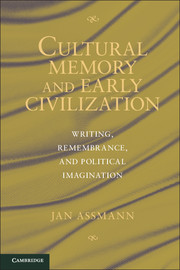Foreword (1992)
Published online by Cambridge University Press: 05 June 2012
Summary
For several years now, the subject of memory has been an increasingly important focal point for both eastern and western minds. I do not regard this as a matter of chance. On the contrary, it seems to me that we are passing through a transitional period in which at least three factors have combined to bring this theme to the forefront. First there are new electronic media for external storage (a kind of artificial memory), and these have brought about a cultural revolution as significant as the invention of the printing press and, in much earlier times, of writing. Second and connected to this, our entire cultural tradition is now permeated with what George Steiner has called a “post-culture,” in which something now coming to an end – which Niklas Luhmann termed “Old Europe” – nevertheless lives on as the subject of memory and of commentary. Thirdly, and perhaps most importantly of all, something else is also coming to an end that affects our very lives as individuals. A generation of contemporary witnesses to some of the most terrible crimes and catastrophes in the whole of human history is now dying out. Generally, a period of forty years is regarded as the threshold beyond which the collective memory begins to fade: the recollections of the living become fewer and fewer, and the various forms of cultural memory become problematical. Even if sometimes the debate over history, memory, and mnemotechnics may appear abstract and academic, it seems to me to nevertheless lie at the very heart of current discourse. Everything points to the fact that the concept of memory constitutes the basis for a new paradigm of cultural studies that will shed light on all the interconnected fields of art and literature, politics and sociology, religion and law. In other words, everything is in flux, and this book itself is in its own way part of that fluidity. It does not claim to offer conclusions, but it sets out to provide directions and connections.
My research carried out with Aleida Assmann at the Wissenschaftskolleg in Berlin in 1984 and 1985 acted as the starting point for this book. To this institution I therefore offer my special thanks. Without the opportunity to attend the lectures, courses, and discussions on a wide variety of subjects, I would never have dared to venture so far beyond the frontiers of my own special subject, Egyptology. In particular, I would like to thank Christian Meier, Peter Machinist, and Michel Strickman, who were all members of a close-knit circle dedicated to discussing the whole question of comparative cultural studies.
- Type
- Chapter
- Information
- Cultural Memory and Early CivilizationWriting, Remembrance, and Political Imagination, pp. vii - xPublisher: Cambridge University PressPrint publication year: 2011

